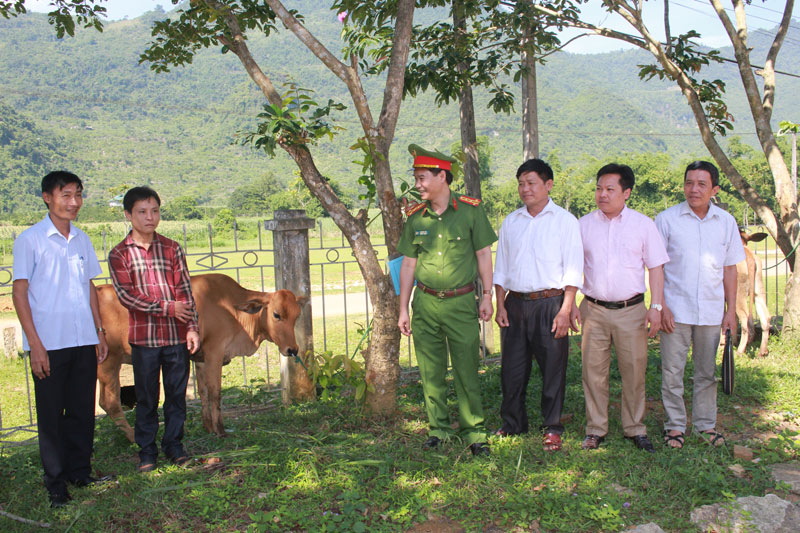
(HBO) - Lac Son District polices have just organized a program of donating cattle breeds named "join hands for community life” at the third time for households having extremely difficult conditions in the area.

The
leaders of Lac Son District Police Department are gifting cow breeds for Mr.
Bui Van Dinh’s family with the witness of leaders of four communes.
During the program, Lac Son District Polices surveyed, assessed
and selected the most difficult households locating in some communes: Chi Dao,
Phu Luong, An Nghia and Huong Nhuong. After that, they selected four households
as Mr. Bui Van Dinh’s family in Be Tren hamlet of Chi Dao commune; Ms. Bui Thi
Hien in Tram hamlet of Phu Luong commune; Ms. Bui Thi Xuyen in Tua hamlet of An
Nghia commune; and Mr. Bui Van Tai in Huong Hoa hamlet of Huong Nhuong commune.
Each household was donated a cow and the total price of four cows was over 50
million VND. This was the fund which individuals of officers and policeman in
Lac Son District Police Department volunteered to donate for charity funds in a
bid of helping households having economic difficult conditions. Among the
households receiving the cattle breeds, there was Mr. Bui Van Dinh who was the
prisoners released and had extremely difficult conditions. He was presented cow
breeds by Lac Son District polices in order to encourage him to reintegrate
into the community.
The program of donating cattle breeds named "join hands for
community life” of Lac Son District Police Department was processed from March
of 2017. After over a year, Lac Son District polices have gifted 10 cattle
breeds (in which a cow spawned) with the total value of about 140 million VND.
This job has deep educational meanings on the spirit of mutual support for
officers, soldiers and policeman, and practical value for poor households.
More than just an information technology teacher, Bui Van Nien is an inspiring figure who has nurtured the scientific curiosity and creative spirit of students in Vietnam’s ethnic minority communities.
Da Bac is the most disadvantaged mountainous district in Hoa Binh province, with ethnic minorities accounting for about 90% of its population. Over the past years, the district has mobilised resources to implement ethnic policies to improve the quality of life of local people.
In recent years, Hoa Binh province has consistently prioritised the protection, care, and education of children, particularly those from ethnic minorities and disadvantaged backgrounds, by creating a safe, healthy, and nurturing environment for their all-round development.
The Steering Committee for Tobacco Harm Prevention and Control of Hoa Binh province, in coordination with the Tobacco Harm Prevention and Control Fund, held a ceremony on May 28 in response to the World No Tobacco Day (May 31) and the National No Tobacco Week (from May 25 to 31). The event was chaired by Nguyen Van Toan, Standing Vice Chairman of the provincial People’s Committee and head of the Steering Committee.
Since 2021, the Center for Industrial Promotion and Industrial Development Consulting (CIIDC) under the Department of Industry and Trade has been implementing a school lighting model as part of the plan for using energy efficiently and economically in Hoa Binh Province in the pẻiod of 2021 - 2025. This model not only aims to improve the learning conditions and enhance the education quality, but it also promotes the message of energy saving, energy security, environmental protection and contributes to the goals of socio-economic development.
In the 2024 - 2025 school year, the entire Hoa Binh provincial education sector includes 520 educational institutions and schools. Among them are 13 ethnic boarding schools with 153 classes and 4,487 students. Four of these schools have met national standards, reaching 30.7 percent.



